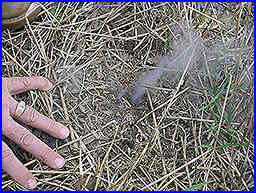



Wormholes - Yet Another Avenue for Pollution?
US - A searchable, online database that allows users to compare information on 2,600 annotated swine genes and proteins related to nutrition and immunity was launched today by Agricultural Research Service scientists.
Wormholes--Yet Another Avenue for Pollution? - US - A searchable, online database that allows users to compare information on 2,600 annotated swine genes and proteins related to nutrition and immunity was launched today by Agricultural Research Service scientists.
They found that water moved through wormholes twice as fast when the holes were within two feet of drainage pipes. The pipes provided outlets that helped the water flow along, instead of slowly percolating through small openings between soil particles.
The study suggests that the most practical solution is for farmers to install shutoff valves so they can turn off drainage during liquid manure application and for a short time afterwards. Some Ohio farmers already do this, with cost-sharing from the Ohio Department of Natural Resources. Another solution would be to install catch basins at the edges of fields to capture water draining from pipes and hold it for reuse. Both would help downstream water quality.
Worms--especially nightcrawlers--are especially attracted to no-till fields in areas that require drainage. They like the combination of no-till, drainage pipes, and the liquid manure farmers often apply to fields.
The worms eat the leftover parts of crops left on the surface by no-till, which skips plowing before planting, and they see the manure as food, too. The drainage pipes aerate the soil nicely, loosening it up for easy digging, especially the soil used to cover the drainage pipes. Plus, the crop residue offers them shelter, and with no-till there's no fear of a plow breaking up their tunnels.
Source: USDA Agricultural Research Service - 15th September 2005
There's no doubt that earthworms benefit agriculture by their tunneling. But a recent study has shown that their burrows might also be funneling liquid manure--and possibly other contaminants--to underground drainage pipes. These, in turn, flush contaminated water onward, bypassing normal filtering and cleansing by soil.
Agricultural Research Service soil scientist Martin J. Shipitalo, at the ARS North Appalachian Experimental Watershed Laboratory in Coshocton, Ohio, and Frank Gibbs, with USDA's Natural Resources Conservation Service in Findlay, Ohio, did the study in no-till fields with liquid manure applied.
 |
| To see whether wormholes funnel manure to drain pipes, ARS scientists trace wormhole connections to pipes by blowing smoke through pipes and watching it pour out of surface wormholes. |
The study suggests that the most practical solution is for farmers to install shutoff valves so they can turn off drainage during liquid manure application and for a short time afterwards. Some Ohio farmers already do this, with cost-sharing from the Ohio Department of Natural Resources. Another solution would be to install catch basins at the edges of fields to capture water draining from pipes and hold it for reuse. Both would help downstream water quality.
Worms--especially nightcrawlers--are especially attracted to no-till fields in areas that require drainage. They like the combination of no-till, drainage pipes, and the liquid manure farmers often apply to fields.
The worms eat the leftover parts of crops left on the surface by no-till, which skips plowing before planting, and they see the manure as food, too. The drainage pipes aerate the soil nicely, loosening it up for easy digging, especially the soil used to cover the drainage pipes. Plus, the crop residue offers them shelter, and with no-till there's no fear of a plow breaking up their tunnels.
Source: USDA Agricultural Research Service - 15th September 2005








